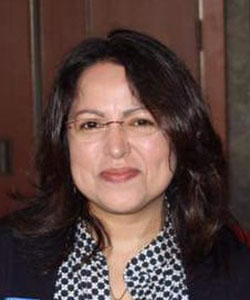
30 Mar NAJIT’s 45th Annual Conference
I came to the profession as many of you did, if you started your interpreting career ten or more years ago. I had a 15-minute phone interview with an agency owner, and I was hired on the spot and given very few instructions.
I started interpreting for mental evaluation appointments, some ILDHS (Illinois Department of Human Services) assignments, arbitrations, sworn statements, and depositions in short order. It all went well, for months really, until an attorney that spoke “some” Spanish challenged my interpretation, and I was asked to leave and the session was rescheduled to replace me with a “proven” interpreter. Certification was not on the table then in Illinois.
When I called the agency and spoke with one of the owners, he asked if I stated on the record that I stood by my interpretation. Of course, I had not! I didn’t know I had to. That is when I realized that “repeat everything the participants say in the first person and do not interject anything yourself” was not enough training to work in a judiciary capacity. A lot of things had to happen before I was allowed close to those types of assignments again. But you do not have to go through such an embarrassing experience. You have options.
That is where the NAJIT 45th Annual Conference comes into play!
Pre-Conference Workshops:
Friday, May 17, 9:00 AM – NOON EDT
One of my favorite presentations of all time, and one that continues being a must, is Judy Jenner’s “ANATOMY OF A DEPOSITION [ETHICS] with ethics CEUs.” I believe anyone who is entering the judiciary field or is planning on working for the first time as an interpreter at a deposition should attend this very valuable presentation. It is a three-hour workshop “about the role of interpreters in depositions, and this workshop will provide an overview of the structure of depositions, the parties, the objectives, the terminology, etc. Attendees will receive plenty of real-life advice on how to manage the flow of information, how to deal with difficult situations, and exactly what to expect during the course of the deposition.” Whatever you do, do not accept a deposition assignment without this very practical learning tool. I did, and it was not a good experience. At that time, I wasn’t even aware that such specific classes were available. This workshop is language neutral, so everyone is welcome.
https://najit.org/najit2024/pre-conference-workshops/
Working depositions requires specifically the skill of consecutive interpretation, which as we know, is the best mode for question-and-answer colloquies, with few exceptions.
Friday, May 17, 2:00 PM – 5:00 PM
Well, as a perfect follow up to Judy’s workshop, we are fortunate that Javier Castillo is presenting that same afternoon on “IMPROVING YOUR MEMORY.” So fitting!
Those two presentations go hand in hand as depositions and consecutive interpretation are inextricably linked. Therefore, team them up for a fantastic deposition-consecutive well-rounded training program.
“In this workshop, participants will learn key techniques to improve their memory and recall. The strategies learned will aid both their short- and long-term memory. Being able to interpret long passages from the witness stand as well as all the items on one’s grocery list will better all aspects of life.”
Interestingly enough, these presentations on memory are unforgettable! I still remember the samples used in one I attended ten years ago. I am serious.
Another element of consecutive interpreting is notetaking. Notetaking does not refer to the writing down of all and every single word you hear the LEP or attorney utter, but signs or words that can help jog your memory. Small clues if you will. Creating a notetaking system, based on symbols or words, can take a lifetime, but we must start somewhere. That place can very well be the NAJIT 45th Annual Conference where Ellen Wingo will be presenting a three-hour workshop on this topic.
“BUILDING A NOTE-TAKING SYSTEM FROM THE GROUND UP”
Friday, May 17, 2:00 PM – 5:00 PM
I have struggled with notetaking my whole professional life and have finally come to the conclusion that although I never learned a specific system, I have a system of my own. Therefore, I could not agree more with this description Ellen shares with us.
“Rather than limiting participants to any particular method, this course introduces elements from many different note-taking techniques, allowing them to knit together a system that works best for them. They will learn how to adapt their system to any length of speech.” This language neutral workshop takes place during the afternoon schedule, so take advantage and pair this with Judy Jenner’s “ANATOMY OF A DEPOSITION [ETHICS] with ethics CEUs” for a well-rounded Depo Bootcamp.
Now, whether you are a beginner or an experienced interpreter, Janis Palma’s insights into language ought to be a requirement for certification. As we all know, communication is made up of many different elements, some verbal, some non-verbal. Janis goes in depth into these and other elements of meaning. In Janis’s own words: “This workshop is designed to provide interpreters with the resources and strategies to acquire an expert’s command of the most basic instrument at our disposal, language, through concrete examples and practical exercises.”
Friday, May 17, 2:00 PM – 5:00 PM
LANGUAGE BUILDING BLOCKS FOR EXPERT PERFORMANCE IN THE SIMULTANEOUS MODE AND BEYOND [ETHICS]
If you are in search of your annual or biennial ethics requirements, you can choose the Judy Jenner – Janis Palma combo for a total of 6 ethics CEUs.
One of NAJIT’s hallmarks is our (yes, our – we, you and I, are also NAJIT) advocacy of certification. We know that not all languages have a certification program, but for all of those that do, as professionals of the most common languages we must make sure to take advantage of the privilege to obtain our available credentials.
I just recently learned that the last state exam in one of the sates where I am certified did not yield a single certified interpreter, at a time when that state, with thousands of Spanish cases in its dockets, has only twenty state certified interpreters available to freelance.
I have heard of many potential reasons for this. Number one could be the lack of knowledge as to what the test entails. As bilinguals, we probably think this is a matter of language skill, and since we have a high level of bilingualism, we imagine that is all it will take.
I have been very lucky in that after that uncomfortable experience I told you about earlier, I attended two college programs with a total of 36 credit hours, and I have since taken four state certification exams, passing them all on the first try, written and oral. But it is not an easy feat, and I prepared for all of them. To have the best chance to succeed, I recommend:
Friday, May 17, 9:00 AM – NOON
“HOW TO PREPARE FOR AN INTERPRETING EXAM” lead by Corinne McKay. Exam results are not always a reflection of our knowledge. They also reflect our state of mind at the time of the test, whether we are nervous, tired, agitated, hungry, anxious, etc. That is why I suggest “preparing to prepare” for a test. A plan is necessary, and Corinne will give you the basics for that. As the objectives of this workshop state: “Attendees will learn how to create a robust training plan for an interpreting exam (with a focus on, but not limited to, court interpreting exams), how to make the best use of available preparation resources, and how to set the stage for a successful exam day.”
Friday, May 17, 2:00 PM – 5:00 PM
As far are exams go, the one administered by the Southern California School of Interpretation on behalf of SOSI to work at the Executive Office of Immigration Review is among the few that are offered for free the first time. But if you fail it, the second time around you must pay both for the course and the exam; why not have the best chance possible by attending “MASTERING THE COURTROOM: A COMPREHENSIVE GUIDE TO IMMIGRATION PROCEEDINGS [SPONSORED BY SOSI]” presented by Francesca Samuel (NAJIT’s very own Vice-Chair, Treasurer and Chair of the Social Media Committee)?
It has been debated whether simultaneous or consecutive interpretation is more taxing, harder, or more complex. I have always felt that simultaneous is the more difficult of the two, but I am sure opinions will differ.
Having already addressed the consecutive mode, simultaneous can be addressed by
INTERPRETING AT THE SPEED OF COURT: TECHNIQUES TO KEEP PACE WITH FAST SPEAKERS [ETHICS], a workshop presented by the legendary James Plunkett III.
Friday, May 17, 9:00 AM – NOON
“To accomplish the goal, interpreters will understand the reason for fast speech in court settings, understand fast speech in English at rates of up to 180 words per minute, develop analytical skills with guided exercises, manage pauses, work with omissions, use more concise target language, and build up speed by interpreting short passages at rates of up to 180 words per minute. Students will record their renditions, review them, make corrections, and plan new strategies to improve their accuracy and completeness at higher rates of speed.”
Wait a minute, what was that all about? Omissions are acceptable in judiciary interpreting? As I have learned from Janis Palma, as long as we do not omit meaning, some of the repetitive words can be omitted. But to help you decide how to do this in a way that allows you to comply with the code of ethics, attend James’s presentation.
I would personally pair James’s and Janis’s presentations together for a solid understanding and management of simultaneous interpretation with three ethics CEUs.
 Want other combos? I would pair Corrine’s workshop on test taking with Javier Castillo’s memory workshop.
Want other combos? I would pair Corrine’s workshop on test taking with Javier Castillo’s memory workshop.
However you choose your sessions and workshops, there will be something for everyone.
Now, if you need additional enticement, think of all the networking opportunities that you will have during these three magical days.
- Free participation on Thursday, May 16: ASTM Meetings – OPEN to all from 8:00 AM to 5:00 PM to learn what is happening in our profession from a standards point of view.
- Photographer onsite for headshots NOON – 6:00 PM on Friday, May 17.
- The Welcome Event, where all attendees are welcome! Friday, May 17, 5:30 PM – 7:30 PM.
- For early risers, our yearly Zumba bash on Saturday, May 18, 6:00 AM – 6:45 AM.
- Keynote Speaker and Conference Welcome 8:00 AM – 8:45 AM on Saturday, May 18 for all main conference attendees.
- Our delicious and informative “Annual Luncheon” for all main conference attendees.
- NAJIT’s Annual Meeting, open to all NAJIT members and non-members.
- More headshots! Photographer onsite for headshots NOON – 6:00 PM on Saturday, May 18.
- Our now staple “Saturday Evening Reception” from 6:30 PM to 8:30 PM on Saturday, May 18.
- For all main conference attendees, the annual Town Hall 8:00 AM – 8:45 AM, Sunday, May 19.
- And last but not least, “Open meeting of the NAJIT Board of Directors (limited seating) on Sunday May 18 from 3:00 PM to 5:00 PM.
Take advantage of the EARLY-BIRD special rates before the April 1, 2024 deadline!
Questions? Reach out to NAJIT headquarters at hq@najit.org
 Hilda Zavala-Shymanik is a state certified/approved Spanish court interpreter and translator with more than seventeen years of experience in legal, medical, corporate, and non-profit settings in New York, New Jersey, Illinois, and Wisconsin and is certified/approved in those four states. Hilda is a former Vice Chair, Board Member, Treasurer, Conference Committee Chair, member of the Training and Education and Advocacy Committees, and current member of the blog team and Chair of the Elections Committee of the National Association of Judiciary Interpreters and Translators, as well as former president of the New York Circle of Translators.
Hilda Zavala-Shymanik is a state certified/approved Spanish court interpreter and translator with more than seventeen years of experience in legal, medical, corporate, and non-profit settings in New York, New Jersey, Illinois, and Wisconsin and is certified/approved in those four states. Hilda is a former Vice Chair, Board Member, Treasurer, Conference Committee Chair, member of the Training and Education and Advocacy Committees, and current member of the blog team and Chair of the Elections Committee of the National Association of Judiciary Interpreters and Translators, as well as former president of the New York Circle of Translators.
She is an active and voting member of NAJIT, ATA, MATI and other professional groups. Hilda has two certificates in Legal Interpreting in Spanish and English, the latest one from NYU. Hilda is the current staff interpreter of the 23rd Illinois Judicial Circuit as well as a Cook County (Illinois) Spanish Interpreter employee. Hilda is a former Staff Interpreter at Essex County Superior Court in New Jersey, where she worked for six years. Born in Chicago, Hilda lived for twenty years in Mexico and loves traveling. She continuously looks for opportunities to promote and advance the interpreting profession. Contact: hshymanik@yahoo.com
Featured photo by Camilo Jimenez on Unsplash. Text-body photos: watch-your-step sign by rfind at pixabay; Water On The Deck by Peter Griffin at PublicDomainPictures.net.

Thank you for all these wonderful recommendations. I’m in Illinois too. Hope you don’t mind my asking, how might I go about getting Illinois Department of Human Services assignments? Do they work with an agency?
Hello Robin. Yes they work with an agency. Please email me and I will send you their way. hshymanik@yahoo.com